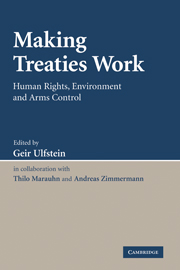Book contents
- Frontmatter
- Contents
- Preface and acknowledgments
- Notes on the contributors
- Table of cases
- Table of treaties and other international instruments
- INTRODUCTION
- PART I INTERNATIONAL HUMAN RIGHTS
- 1 Dispute resolution, compliance control and enforcement in human rights law
- 2 The International Covenant on Civil and Political Rights
- 3 The European Convention on Human Rights
- 4 The European Convention on the Prevention of Toture compared with the United Nations Convention Against Torture and its Optional Protocol
- PART II INTERNATIONAL ENVIRONMENTAL LAW
- PART III INTERNATIONAL ARMS CONTROL
- GENERAL COMMENTS
- Index
2 - The International Covenant on Civil and Political Rights
Published online by Cambridge University Press: 05 September 2009
- Frontmatter
- Contents
- Preface and acknowledgments
- Notes on the contributors
- Table of cases
- Table of treaties and other international instruments
- INTRODUCTION
- PART I INTERNATIONAL HUMAN RIGHTS
- 1 Dispute resolution, compliance control and enforcement in human rights law
- 2 The International Covenant on Civil and Political Rights
- 3 The European Convention on Human Rights
- 4 The European Convention on the Prevention of Toture compared with the United Nations Convention Against Torture and its Optional Protocol
- PART II INTERNATIONAL ENVIRONMENTAL LAW
- PART III INTERNATIONAL ARMS CONTROL
- GENERAL COMMENTS
- Index
Summary
General issues
Basic features
The International Covenant on Civil and Political Rights (ICCPR) was adopted by the United Nations General Assembly in 1966, and, after the required number of ratifications, it entered into force on 23 March 1976. To a large extent the Covenant, together with the simultaneously adopted International Covenant on Economic, Social and Cultural Rights, codifies in the form of a legally binding international treaty the human rights enshrined in the Universal Declaration of Human Rights of 1948.
The rights protected under the Covenant range from the right to life (article 6) to the right of public participation (article 25), from the right of all peoples to self-determination (article 1) to rights of members of minorities (article 27). Despite its name, the Covenant is not restricted to ‘civil and political rights’ in the narrow sense. The above-mentioned provisions on self-determination and minority rights include important dimensions related to economic resources. The prohibition against discrimination (article 26) is overarching in nature, hence extending, for instance, to social, economic and cultural spheres. The provision on the right to freedom of association (article 22) explicitly covers also trade union rights. The right of all persons deprived of their liberty to humane treatment (article 10) addresses also the practical conditions of detention and hence the obligation of the State to allocate economic resources to secure that its prison conditions meet international standards.
- Type
- Chapter
- Information
- Making Treaties WorkHuman Rights, Environment and Arms Control, pp. 48 - 69Publisher: Cambridge University PressPrint publication year: 2007
- 18
- Cited by



